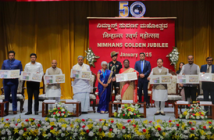New Delhi: ‘You may be a veer, not Agniveer’: SC judge to lawyer challenging Agnipath scheme. Supreme Court judge Justice D.Y. Chandrachud on Tuesday made a witty remark amid intense argument by counsel during hearing on pleas challenging the Agnipath scheme in the armed forces.
Advocate M.L. Sharma, who had moved the top court challenging the constitutional validity of the Agnipath scheme, vehemently argued that he was the first one to move the court against the scheme. In a light vein, Justice Chandrachud told Sharma: “You are not aggrieved. You have filed a PIL. Not a prospective Agniveer. You may be a veer but not an Agniveer.”
The remarks from the judge brought smiles amongst the advocates present in the courtroom. Justice Chandrachud was trying to point out that Sharma was not an aggrieved party in the matter, and instead, had filed a public interest plea.
Justice Chandrachud said there is a petition connected with the scheme in the Delhi High Court. “We can benefit from the reasoning of the high court in this case. We will benefit from the high court view,” he said.
Sharma contended that there are 20 high courts and all petitioners will reach every high court. “I had filed the first plea here and after this, they went to the high court. May be at the behest of respondent,” he said.
Justice Chandrachud said Prashant Bhushan filed a plea in high court and he cannot file at the behest of the Solicitor General. Sharma said in Hindustan Zinc matter his plea was dismissed but a similar plea by Bhushan was accepted. “This is happening with me,” said Sharma, who is known to file public interest litigations frequently on a range of issues.
The top court was hearing three separate pleas filed by Sharma, Harsh Ajay Singh and Ravindra Singh Shekhawat. After hearing arguments, the top court transferred all petitions against the scheme to the Delhi High Court. The bench, also comprising Justices Surya Kant and A.S. Bopanna, asked the High Courts of Kerala, Punjab and Haryana, Patna, and Uttarakhand to transfer the petitions against the scheme pending before them to the Delhi High Court or keep them pending till the Delhi High Court decides the matter, if the petitioners so desire.
The bench noted that the multiplicity of writ petitions on the subject will not be desirable and pan-India issue does not mean that the top court should hear it, rather one of the high courts can also hear it, and it has been done earlier.
It favoured petitions pending in other high courts may also go to the Delhi High Court to avoid inconsistent decisions. The top court said if any PIL is filed in future on the same issue, challenging the Agnipath scheme notified by the Centre on June 14, then it would also be given the same option by the high courts concerned.
Justice Chandrachud said: “We must have a considered view of a high court. The high court jurisdiction under Article 226 of the Constitution should not lose significance.” ‘You may be a veer, not Agniveer’: SC judge to lawyer challenging Agnipath scheme.
The top court said the other high courts, where similar petitions are pending, would give an option to the petitioners to either transfer the matter to the Delhi High Court or move the Delhi High Court as an intervener.
Sharma’s plea said: “According to the impugned press note…dated 14.06.2022 after 4 years out of 100 per cent selected candidates for Permanent Commission in Indian Army 25 per cent will be continued in Indian Army force and the rest 75 per cent will be retired /denied jobs in the Indian Army. During 4 years they will be paid salary and perk but after 4 years denied candidates will get no pension, etc.”
Another writ petition was filed by a group of persons shortlisted for airman selection in the Indian Air Force, who sought a direction that the recruitment process which commenced in the previous years should be completed regardless of the Agnipath scheme.



